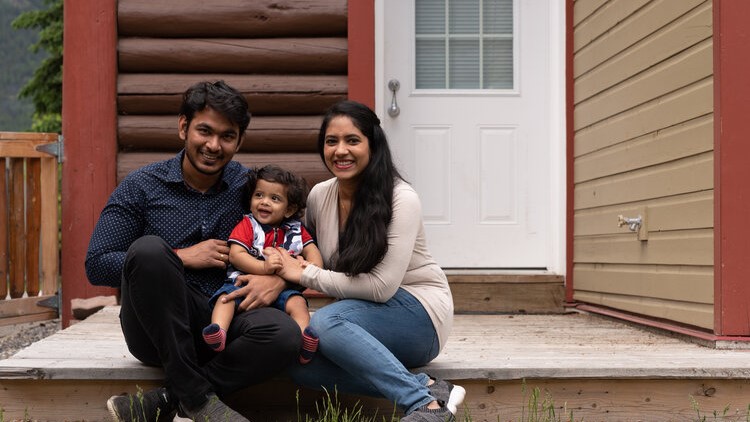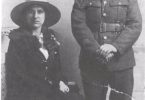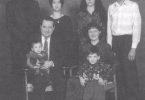This oral history interview was conducted by Canmore Museum on July 27, 2020.
CM: Can you tell me your full name?
Shyamilli: Shyamilli Velmurugan. That’s my full name.
CM: So I’m here with Shyamilli. It’s the 27th of July. So first of all, just tell me how you’re doing in general. How are you feeling?
Shyamilli: In general I’m okay. But just since yesterday I’ve been having a sprain in my back.
CM: Oh no.
Shyamilli: Still a little sick, and I have a little boy now, he’s almost one year old.
CM: Oh, wow. So you’ve got lots to do.
Shyamilli: Taking care of him and taking care of myself with the back pain is a little bit tough at the moment.
CM: Yeah, totally. Oh my gosh. Please leave your video on, I’m going to turn my video off just cause it means the connection is better.
Shyamilli: Okay.
CM: Well that sounds really tough. To be honest, back pain is never fun.
Shyamilli: I know. Like maybe after the baby, it’s just getting worse. I got really bad back pain but, I put the massager on, nothing where it should have. It’s just been really bad.
CM: Oh, that sounds awful. You know, I guess when you have a baby, all the muscles in your pelvis and your abdomen get all kind of stretched out. So maybe that’s why you’re having problems.
Shyamilli: I think so too. I’ll wait for a couple of days and maybe check in with the doctor.
CM: Yeah. If it doesn’t go away, that makes life so hard though. Especially if you have stuff you have to do. So, are you married? Do you have a partner?
Shyamilli: Yes, I have my husband, we’ve been married a couple years now.
CM: So you said your son was how old?
Shyamilli: One year.
CM: Can I see him? Is he there?
Shyamilli: He’s actually taking his nap.
CM: I’m excited for you. Congratulations. [laughter]
Shyamilli: Thank you. He’s one on August 11th, almost.
CM: Oh my gosh. So you must be excited. A good friend of mine had a baby about a year and a half ago and we live by his nap times now.
Shyamilli: Sorry, I lost you.
CM: I said a good friend of mine had a baby about a year and a half ago. And we live by his nap times now. Well, I understand, when the baby sleeps, you do what you want to do. Anyway, so I’m just gonna start into our questions. I don’t want to take up too much of your time. Um, but can you tell me a little bit about what your day looks like right now?
Shyamilli: Yes. Right now I’m not working, so I’m just taking care of my baby and being a stay at home mom. I just feed my baby breakfast, lunch, and dinner, and breastfeed, and whenever he wants. And he’s a big guy, so he demands a lot. So my whole day is just around him. I took him out to my friend’s place for play dates, which just restarted recently after the quarantine. So just a month ago, we all started meeting. Weekly, at least two or three days, I take him for a play date. And that’s about it, my day is truly around my baby.
CM: Yeah, well, totally. They are a lot of work. When quarantine started, how did your routine change with you, and your son and your husband? What was different?
Shyamilli: So my baby was about five or six months when the quarantine started, and we just made new friends before that. I mean, to make clear about myself, we just got to Canada in January.
CM: Yeah. Tell me a bit more about that.
Shyamilli: Yeah. So we moved to Canada on January 16th, I believe. And then being in Banff. So yeah, it was hard at the beginning, I guess we didn’t have many friends, but I live with family here, my brother’s family. So that’s a good spot for us.
But other than that, we just started making new friends in February. And we probably met a couple of times with kids my son’s age. And I was hoping I could take him to the library, play a lot, teach him a lot of new things and make him meet new people, socialize basically. And then the lockdown happened. Probably, he just forgot other people existed in the world, you know?
CM: Yeah. Just you and you and dad, I guess.
Shyamilli: I’m myself, my dad,and my brother and his wife. And she was pregnant at the time. Now they have a baby. The baby is three months old, so they have just pretty much the four of us. My baby was just with the four of us in our house. And I couldn’t take him out anywhere. That was the main problem I faced because my baby, he loves playing outside, he loves grass, he loves to go out at least to a friend’s house, at least for him to play with other kids. I loved it when he got excited meeting new kids. So that was the main issue we had, and of course work.
CM: Right. So the thing before- go ahead. Sorry. We’re just having some connection issues here.
Shyamilli: I think so too.
CM: You know what? I’m just going to call you back. Okay? Yeah, because that often-
Shyamilli: It works [00:06:00] for my phone. Maybe it’s not that clear. Just ring me from my laptop. Is that okay?
CM: Yeah. So why don’t you just rejoin the meeting? Okay. I’ll end it.
Shyamilli: Is this better?
CM: Oh, loads better, actually. Yeah, that’s great. Thank you. I’m just gonna make it a bit louder. Okay. Can you just say something for me? That’s perfect. Thanks. That’s lots better, actually. I really appreciate it. I’ve done lots of these interviews over zoom with varying quality of audio, I have an intern this summer, who’s transcribing all of them, so he listens to the recording and then writes it down, and he’s had his work cut out for him, that’s for sure.
Shyamilli: Okay, so sorry. English is my second language, so pardon me?
CM: No, you don’t need to apologize. Your English is excellent and you actually have very little accent. Were you educated in English?
Shyamilli: We studied English from kindergarten.
CM: Yeah. No, your English is fabulous. You don’t need to apologize for that. So in terms of your household, it sounds like there’s a lot of folks living there. So it’s [00:09:00] you and your husband and then your- Sorry. Did you say your brother? Can you remind me, tell me a bit more about your household.
Shyamilli: So our house, it’s a seven room house. It’s basically a staff accommodation for our restaurant. So we also have our staff living in the same house. And it’s my family, myself, my husband and my baby, and my brother’s family, my brother, his wife, and his daughter, and my sister in law’s mother.
CM: Wow.
Shyamilli: The main floor is family. And then upstairs there’s three staff.
CM: Right? So what restaurant do you own?
Shyamilli: The Indian Curry house. It’s on Banff Avenue right next to Boston Pizza.
CM: Okay, how long has your family run that business?
Shyamilli: Since 2016.
CM: Wow. Okay. So how did you end up coming to Canada?
Shyamilli: [00:10:00] so basically my brother and myself, we both came to Canada as students in 2012. So I came in 2012 and my brother came in 2009. So we both went to SAIT college and studied there. I’m a petroleum technologist myself, and my brother did hospitality management, so he just came to Banff as an intern. He started his internship here in Banff and he loved the place. And we found this new place coming up for rent, for commercial space. So he just took the place up, and since 2006 we’ve been running it. I moved back to India in 2018, got married, had a baby, and came back to Canada.
CM: Oh my goodness, a whirlwind.
Shyamilli: [laughter] With my husband and my baby as an immigrant.
Amy: Yeah. How was your experience being an immigrant during the pandemic? Do you think it’s been different for you, or the same? Tell me a little bit more about being a non-native Canadian person.
Shyamilli: Basically our life always depends on work, right? It revolves around work. So we didn’t get to work much during the pandemic situation for sure. So we were a little tight on the budget, and other sorts of stuff but at least we had our family for support together. So even though it was pandemic, we just stayed in the house, we still had our own place. It was not that hard with the family around if you were single, then that’s different.
CM: Very isolating for sure. So did everyone get along? You know, if you have to spend a lot of time together there can be some arguments. So how did that go?
Shyamilli: We do get on eachothers nerves sometimes, but my husband, he’s a very easy going guy, so he made sure that we all- are you there?
CM: Yes, I’m here. Sorry. We’ve been having some problems with the wifi lately, but I think it’s okay.
Shyamilli: Okay.
CM: Okay. So where- Oh, your husband is an easy going man?
Shyamilli: Pretty cool guy. So he made sure that we are all together and here that we don’t fight much.
CM: Good. How did you guys meet each other?
Shyamilli: My husband?
CM: Yeah.
Shyamilli: My brother got married in 2017, so I went back home for my brother’s wedding and I met him at my brother’s engagement. And then after a year I got married.
CM: I think a lot of people-
Shyamilli: I basically knew him only for a year and a half. I met him February 2017 at my brother’s engagement. He is actually my brother’s highschool mate, but I never met him back then.
CM: Oh, funny. Yeah. I think a lot of people meet their future spouses at weddings.
Shyamilli: At weddings, yeah.
Amy: That’s very funny.
Shyamilli: Especially at my own brother’s wedding.
CM: So you’re all one big family now. For the restaurant, is that where the majority of your income comes from?
Shyamilli: Yes.
CM: Yeah. So how did it feel the day that you found out you were going to have to close the store? What were you guys thinking?
Shyamilli: It was definitely hard because that is our breadwinner. Our life depends on the restaurant, right? So we basically didn’t close. We didn’t close fully throughout the pandemic, we kept it open and we did have a lot of locals who supported us during the pandemic situation. We made sure that we are safe ourselves. We closed it for dining only, and we were still doing deliveries and take out. It was definitely not the same as before, pre-pandemic, but it helped us a little bit at least.
Amy: Yeah. It brings in a little bit of income for sure.
Shyamilli: It was very hard. We, like all our friends, don’t want to close down the business. We hear a lot of them doing, “We just want to survive for the year, no matter what.” And I think we just hung in there.
CM: Do you think-
Shyamilli: – and my brother who was helping out a little bit, other than that, my husband and him stayed home most of the time, it was not the same. We wish it was better.
CM: I bet you do. I can totally understand that for sure. That’s that’s really stressful for you guys. I imagine you worried a lot.
Shyamilli: We were hoping, at least it would open by summer, which it did. Thank God. But even then, the tourism Banff is completely based on tourism, right? We had no outside tourists and especially Indians.
Being an Indian restaurant, we depend on people that travel from all around the world, like the UK or US who love Indian food. We’re totally dependent on them, but obviously that didn’t happen. They’re not going to open the borders so soon, so it’s definitely not the usual summer that we experience. I would say even less than 50% is what we are earning right now, but it’s still better than what we thought it could have been, you know?
CM: Yeah. Well, it must’ve been a relief for you when restaurants were allowed to open again. So, If you’re at home, your husband [00:16:00] is working in the restaurant, right? And your brother is. Are you worried they’re in the kitchen, your staff living upstairs, did you have to lay off your staff? How did that work?
Shyamilli: What was the question?
CM: Did you have to lay off your staff? Because the staff live upstairs. So how did that go?
Shyamilli: Yes, we did lay them off, but obviously they couldn’t go back to India because most of them we hired directly from India, being an Indian restaurant.
CM: Which explains why your food is very delicious.
Shyamilli: They just stayed upstairs and we kept feeding them from the restaurant, since we are still open. It was not that bad. So they were able to cook for themselves and they fed themselves, with our restaurant produce of course. It was ok. We made sure that we keep sanitizers right when they enter the house, and they take a shower right away in the house after work, and same for my brother and husband, they both do the same. We make sure, I mean sanitizing all the time. And even in the restaurant, they make sure they sanitize for each and every table that they received, they go and attend. So yeah, basically trying to keep our kids and our family safe.
CM: Yeah. Absolutely. Are you frightened about getting sick? How worried are you about that now that the shop is open again?
Shyamilli: I am a lot scared. I keep telling my husband, please be careful, please be safe. We sanitize all the time, I keep telling them, my brother had and husband, other than that, actually it’s okay. I think, in India, people are drinking this immunity drink, which we prepare at home. So I made it all the time for them, whenever they go outside, I prepare that for them. So it’s basically with all the herbs and spices that we use for our cooking. So we just make it like a drink.
CM: Oh, it sounds strong.
Shyamilli: I make it, I make sure they drink that because it increases the immunity, Indians are blessed with good immunity.
CM: Speaking of which. your family must be back home in India, right?
Shyamilli: Yes, my parents and my husband’s brother.
CM: How are they doing? Are you scared for them? What’s that experience been like being apart from them during this time?
Shyamilli: India, if you see now, it’s the highest or third highest country with the most active cases, right? So, yes. In the main cities, it’s pretty bad. Our family moved from the city to our native place, which is like a small town. [00:19:00] And it’s a lot safer there. Pretty much all our extended families are not living in the cities. They have houses in our villages and hometown, a small native place. So all of them are there.
CM: Where are you from originally? What’s the name of the town
Shyamilli: The city? It’s Chennai
CM: I’m just curious, I always like to look it up. Can you spell it for me?
Shyamilli: Sure. It’s, C H E N N A I, Chennai.
CM: Oh, I see. I’m just curious, India is a fascinating place to me. Yeah, I can imagine then it looks like it’s like a big city. It would be hard to stay apart. Yeah, for sure.
Shyamilli: Half of Canada’s population lives in just that one city.
CM: So it must be very different for you to be here, than you are for your parents right now.
Shyamilli: Yes. We feel a lot safer here than for them to live in the city there. So that’s the way right. When the lockdown started, they all moved to the village.
CM: Have you been talking to them often on the phone?
Shyamilli: Yes. Pretty much every other day.
CM: Yeah. For you guys in your household, what’s been the most challenging part of this whole experience? I know things are a little bit more open now, but especially during the worst of the lockdown, what were you struggling with the most?
Shyamilli: Definitely not being able to go outside and meet people. Socializing was a big problem. I mean, especially with the kid, right? Keep them locked down in the house. And of course, financially we struggled a little bit too.
CM: Yeah. I’m sure that must’ve been really stressful.
Shyamilli: Yes, thankfully CERB helped us out a little bit, because we were not qualified for EI.
CM: Right, right. So you probably went on CERB. Was your husband able to, because he was still working?
Shyamilli: No, he was not working, he just started a month ago with my brother. Then part time.
Amy: So it sounds like this might be a problem for you for a while financially. That would be really stressful. I’ve been lucky enough to be working the whole time. So I’ve had good fortune in that respect. Some people I’ve talked to, and not everybody for sure, have found sort of secret blessings in this time, there’s things that they’ve liked about it. Have you found anything like that or are you just like, “Oh my God, I can’t wait for it to be over.”
Shyamilli: Most of the time, I felt like that, yes. I just want to get out, please, please. Why has Corona happened?
CM: Yes, absolutely [laughter].
Shyamilli: I was also thinking that my husband, he would have not stayed home and [00:22:00] enjoyed playing with his kid without this pandemic or lockdown. Because most of the time he was home, he was happily enjoying all my kid’s milestones. He started standing up and he started walking in my house. My husband was here during that time.
Amy: Oh, how nice is that?
Shyamilli: So, maybe like 20% I was definitely happy that we all got to stay together.
Amy: Yeah. Some family time. Well, your child, around kind of nine months, one year is when lots of stuff starts happening. You know, sounds, and walking, and eating solid foods. So it’s a good coincidence for you guys.
Shyamilli: Yeah.
CM: And-
Shyamilli: Sorry. The main challenge we faced was for my sister-in-law’s pregnancy because she gave birth in April. So we were not allowed in the hospital, right?
CM: Oh, how sad.
Shyamilli: Yeah. We were hoping that we would be together with my brother and her, witness the baby’s birth and stuff, but her mom was not allowed, just my brother and his wife. So it was just the both of them in the hospital, we were not even allowed to go near there. So that was another challenge we face during the pandemic, raising a baby and having a pregnancy in a pandemic.
Amy: Yeah, absolutely. I’ve often thought about ladies who are going to have babies right now, especially since you must’ve felt so sad that you couldn’t be there at the hospital. That’s such a big moment in somebody’s life. So, how long were they at the house? When did they come home with the baby?
Shyamilli: The baby was born on the third. So they were there a day before and they got home by six. They were there for four days.
CM: So how have things been with a newborn baby in the house during the pandemic? Are you going crazy from all the crying or you’re used to it by now?
Shyamilli: Definitely, it was a little harder for them as well. I got used to it because-
CM: You’ve had a baby already.
Shyamilli: I had an older baby already, but it’s definitely harder for them. Now it’s gotten a lot better.
CM: Yeah. What’s your son’s name? You didn’t say.
Shyamilli: Oh, Pratyush. P R A T Y U S H. We call him Prat.
Amy: Definitely for English speaking tongues. That’s a long name.
Shyamilli: My friends call me Shy because it’s easier for them than Shyamilli. So they shortened my name to Shy when I went to college. [laughter]
CM: Definitely, English is a language that does not translate very well to pronouncing any other languages in the whole world. I speak a little bit of French, but mostly English. So I’ve embarrassed myself in many languages. I mean, your English is fabulous and you have just enough accent to be very cute.
Shyamilli: Thank you.
CM: You’re welcome. So, during this time, what do you think you’re going to remember the most? What are you going to tell your son about when he’s 10 years old or 20 years old? What are you going to tell your grandkids, maybe, in the future?
Shyamilli: Maybe when he wants to be out and about all the time, I would say, you know, there was a time for four months. Where we just stayed inside the house. I was ok with that.
CM: [laughter] Well, to be with your little baby, that’s nice.
Shyamilli: Yes. Yeah, that’s pretty much it, you know, the whole world was shut down and we never thought that would happen. Right? The pollution almost got to zero and even in India, I’m not sure if you’re following.
CM: Yes, indeed.
Shyamilli: Yeah. The pollution level has dropped down so much that they could even see mountains, which are like a hundred kilometers away.
CM: Oh, really? That’s kind of an amazing thing.
Shyamilli: It’s a big thing because India is really bad with pollution, and during the pandemic this happened. The pollution has fully gotten better and people are able to breathe the good air in Delhi, it’s been pretty bad for 10 years. And finally people are able to get rid of the smoke that was in the air.
CM: Yes. It’s changed a lot for a lot of people. What do you think will change the most about our world going forward?
Shyamilli: Just people being thankful and I believe going forward. I just feel that people should be thankful that they are alive. They were able to experience such a huge thing. During this time, what else? Being grateful for what we have. That’s it, I guess.
CM: It’s such a strange time. It’s such a strange experience, how do you think your personal behavior will change in the future, or your thoughts or your perspective?
Shyamilli: Oh, definitely for me, now I know what the bigger thing is. Just don’t be selfish. Don’t think about small [00:28:00] minor things in your life. Just always see everything from a bigger picture. There’s a lot more things you cannot control. I’ve been so grateful for whatever I have, and whatever I experience In my life.
CM: Yeah.
Shyamilli: Minor problems or not- I’m the kind of person who used to feel bad, even for small things, even like a small minor accident or whatever happened. I used to feel bad or, like suffer myself, but now I just feel like there are bigger things you have to see in life. The small things that happen around you, it’s not important. I’ve seen things from a different perspective for sure, after this.
CM: it sounds, it sounds like you definitely feel like this has made your life different.
Shyamilli: Yes.
CM: Yeah. For your family or your household, do you think that you are closer to each other because you’ve had to spend so much time together or do you- I know it’s much more common in India to have households where many generations live together. But tell me more about how you think this has changed your relationships with your family.
Shyamilli: Yes. Even back home, we have a joint family. We are like 10 to 12 people in one house, in a three bedroom apartment. We lived together back home, and here also, we will always be closer to people and, then closer to family and during the pandemic, sharing everything, cooking together, raising kids together. It’s definitely gotten us a lot closer. And especially with my brother, we were away for two years. Even before that, I lived with my brother back until 2018. This was my first time living with my sister in law and her mom and their newborn baby. So it’s definitely gotten me closer with the new extended family.
CM: Yeah. Well, you guys have this shared experience forever now, right? Your whole life you’ll remember it. Well, I don’t have a lot more questions. Let me think. Is there anything else that I’ve missed? I think I have two more, which are the big ones. The first one is, is there anything that you’re scared of or that you’re worried about?
Shyamilli: Worried about? Definitely, the outbreak becoming- the second wave, they call it. I’m just worried about that. I just hope it never happens in Banff, because Banff is the place where so many people from all over Canada come here. [00:31:00] I just really hope it doesn’t happen again because my husband, and my brother, and my family, and our staff, they are- Not just them, in general people- I just don’t want that to happen again in Banff, because I do see the numbers increasing and we try to be as safe as possible, but it’s just not in our hands, but I really hope the second wave just never happens.
CM: I think a lot of people are feeling scared about that right now. Yeah. And my last question, this one, everyone always goes, “Huh?” when I ask this one. This interview, it’s sort of like a phone to the future, right? Researchers and people might listen to it or read parts of it in museum exhibits and stuff like that. So, you know, I’ve read documents and archives that are four or 500 years old, and it’s a way to connect with people in the past. So for you, you have a chance to speak directly to the future. What would you want those people to know about your time, or your experience, or your life during the pandemic? I know it’s a tough one. Take your time. It’s a big thing.
Shyamilli: That’s a big thing! [laughter] I guess I didn’t get a chance to see the questions beforehand.
CM: No, that’s okay. I’ve got lots of time. I don’t, I don’t want you to rush.
Shyamilli: For future generations… Definitely. The world we live in is so beautiful for sure. Unexpected things like this do happen, but it doesn’t change who we are. We, especially during this time, so many people help each other, and yeah. People have come out stronger than before I feel, even though so many people lost their family members, like even our distant relatives, a couple of them passed away due to this virus.
Amy: Oh, that must be very sad.
Shyamilli: Yes. They’re distant relatives, not super close, but still lives, right.
CM: Well, and it makes it feel close to you. It makes it feel closer to you. Yes.
Shyamilli: Yes, definitely. Because we had zero cases around in our nearby circle, but hearing of family, like a couple, passing away is a big, big thing. But anyways-[baby crying]
CM: Is that your baby?
Shyamilli: Just one second.
CM: It’s okay. You know what, I’m going to say bye. I’ll let you go and take care of your son, but it was really nice to meet you, and I hope we can chat again one day soon. You take care, okay?. Thank you. Bye bye.
Shyamilli: Glad I could help.
CM: Take care. Thank you so much. It was a great help to us. Really big. Okay. Let’s talk again soon. Okay. Bye. Bye.
Shyamilli: Bye.
The Stories of Resilience project offers deeply personal insights into the lives of Bow Valley residents during the COVID-19 pandemic. They each share their unique challenges, fears, hopes, and lessons learnt during this unique time in history. This project was brought to life by a collaboration of local organizations: Bow Valley Immigration Partnership (BVIP), artsPlace Canmore, Kristy Wolfe Photography, Canmore Museum. With special thanks to Community Connections in the Bow Valley.
Explore More Stories of Resilience







